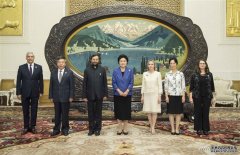Across China: Bilingual books gain popularity among Tibetan
CHENGDU, March 16 (Xinhua) -- Educational authorities in Sichuan Province, southwestern China, will commission more materials to meet the growing demand for bilingual books.
The educational bureau of Aba (also translated as Ngawa) Tibetan and Qiang Autonomous Prefecture in Sichuan said it had published 56 Tibetan and mandarin Chinese bilingual books.
In the next five years, 560,000 books will be distributed to kindergartens and schools in the prefecture, it said.
China is promoting bilingual education in all Tibetan areas, however, efforts have been held back as supporting literature is in short supply.
Aba leads bilingual literature publication in Tibetan areas. Its educational bureau asked academics to translate, publish and distribute material for preschoolers in March last year. The books are not yet for sale to the public.
Khenpo, a fifth grade student in Aba, said she and her classmates liked the book's illustrations.
Ma Qingchun, a mandarin teacher at Aba Ethnic Boarding School, which is attended by mostly Tibetan-speaking students, said rural students speak Tibetan better, but children who grow up in the city have a better grasp of mandarin. The bilingual books help them use the language they are comfortable with to assist learning the other.
Most of the books are about science and stories such as "Wanderings of Sanmao," a popular Chinese animation, and "Father and Son," written by German writer E.O. Plauen.
Some books are written in Tibetan dialects, such as Amdo. "My Grassland, My Home" is one for elementary students. It covers traditional rituals, craftsmanship and the "Epic of King Gesar," the Tibetan legend. The chapter on hada etiquette, a long, scarf-like piece of white silk used by Tibetans for blessings, teaches students how to present hada to their elders, esteemed religious figures, peers and juniors.
"The books help the students learn about their own identity and culture," said Yummetso, a fifth grade Tibetan language teacher at Aba Ethnic Boarding School.
Most of her students have read all 32 bilingual books, and they are asking for more, she said.
"We would like more sci-fi as well as some on animal lives, popular science and detective stories," she said.















